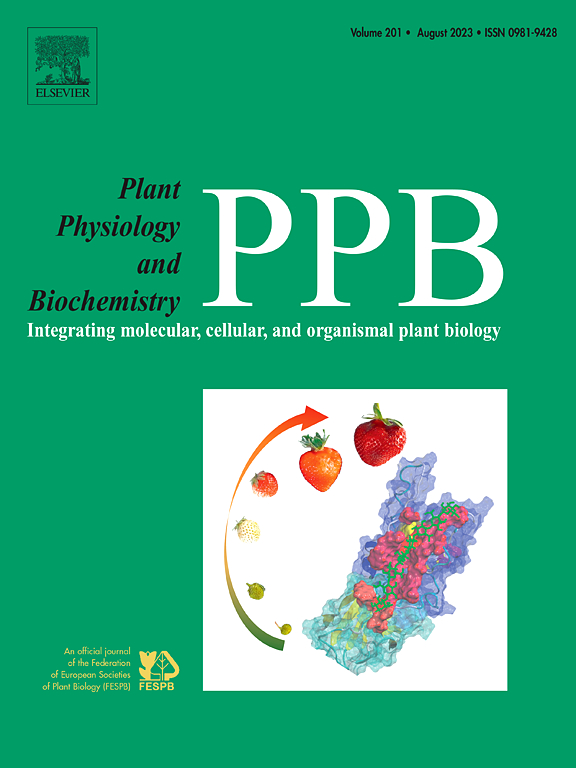OsCNGC7 modulates calcium dynamics and accelerates leaf senescence in rice
IF 6.1
2区 生物学
Q1 PLANT SCIENCES
引用次数: 0
Abstract
Calcium plays a crucial role in regulating plant senescence. However, the specific effects of increased intranuclear calcium versus cytoplasmic calcium on aging remain unclear. Cyclic nucleotide-gated channels (CNGCs), which manage Ca2⁺ levels in plant cells, are particularly significant in this context. These channels are known to relocate between the nuclear envelope and the plasma membrane in response to stress and developmental signals. Through this movement, CNGCs help regulate the balance of cytosolic and intranuclear Ca2⁺. In this study, we categorized the 16 CNGC genes in rice into five subgroups. OsCNGCs are notably expressed in leaves, especially during the reproductive stage. Both OsCNGC6 and OsCNGC7 exhibit dual localization to the plasma membrane and the nuclear envelope. Knockdown of OsCNGC7 led to reduced levels of Ca2⁺ and K⁺ in plants. Conversely, yeast expressing the OsCNGC7 gene showed increased sensitivity to Ca2⁺. Additionally, while the [Ca2⁺]cyt was maintained at relatively low levels in both wild-type and OsCNGC7-RNAi lines, the fluorescence intensity was significantly higher in OsCNGC7-overexpressing lines, particularly in the nucleus of root tips. Overexpression of OsCNGC7 resulted in enhanced stomatal opening and accelerated leaf senescence from the tillering stage to grain filling in rice. Treatment with MeJA rapidly induced OsCNGC7 expression, while knockdown of OsCNGC7 delayed both MeJA-induced and dark-induced leaf senescence. Further analysis revealed that OsCNGC7 interacts with OsKAT2 and OsALMT2. In conclusion, our findings highlight the distinct roles of OsCNGCs in regulating senescence. This knowledge could provide new strategies for manipulating plant senescence and enhancing crop productivity.
OsCNGC7 调节钙动力学并加速水稻叶片衰老
钙在调节植物衰老中起着至关重要的作用。然而,核内钙和细胞质钙的增加对衰老的具体影响仍不清楚。环核苷酸门控通道(CNGCs)可管理植物细胞中的钙离子浓度,在这方面的作用尤为重要。众所周知,这些通道会随着压力和发育信号在核膜和质膜之间迁移。通过这种移动,CNGCs 有助于调节细胞膜和核内 Ca2⁺的平衡。在这项研究中,我们将水稻中的 16 个 CNGC 基因分为五个亚组。OsCNGCs 主要在叶片中表达,尤其是在生殖期。OsCNGC6 和 OsCNGC7 都表现出在质膜和核包膜上的双重定位。敲除 OsCNGC7 会导致植物体内 Ca2⁺和 K⁺ 的水平降低。相反,表达 OsCNGC7 基因的酵母对 Ca2⁺ 的敏感性增加。此外,虽然野生型和 OsCNGC7-RNAi 株系的[Ca2⁺]cyt 都维持在相对较低的水平,但 OsCNGC7 基因过表达株系的荧光强度明显更高,尤其是在根尖的细胞核中。OsCNGC7的过表达导致水稻从分蘖期到籽粒灌浆期气孔开放增强,叶片衰老加速。用 MeJA 处理可快速诱导 OsCNGC7 的表达,而敲除 OsCNGC7 则可延迟 MeJA 诱导的叶片衰老和黑暗诱导的叶片衰老。进一步分析发现,OsCNGC7 与 OsKAT2 和 OsALMT2 相互作用。总之,我们的研究结果突显了 OsCNGCs 在调控衰老中的不同作用。这些知识可为控制植物衰老和提高作物产量提供新的策略。
本文章由计算机程序翻译,如有差异,请以英文原文为准。
求助全文
约1分钟内获得全文
求助全文
来源期刊
CiteScore
11.10
自引率
3.10%
发文量
410
审稿时长
33 days
期刊介绍:
Plant Physiology and Biochemistry publishes original theoretical, experimental and technical contributions in the various fields of plant physiology (biochemistry, physiology, structure, genetics, plant-microbe interactions, etc.) at diverse levels of integration (molecular, subcellular, cellular, organ, whole plant, environmental). Opinions expressed in the journal are the sole responsibility of the authors and publication does not imply the editors'' agreement.
Manuscripts describing molecular-genetic and/or gene expression data that are not integrated with biochemical analysis and/or actual measurements of plant physiological processes are not suitable for PPB. Also "Omics" studies (transcriptomics, proteomics, metabolomics, etc.) reporting descriptive analysis without an element of functional validation assays, will not be considered. Similarly, applied agronomic or phytochemical studies that generate no new, fundamental insights in plant physiological and/or biochemical processes are not suitable for publication in PPB.
Plant Physiology and Biochemistry publishes several types of articles: Reviews, Papers and Short Papers. Articles for Reviews are either invited by the editor or proposed by the authors for the editor''s prior agreement. Reviews should not exceed 40 typewritten pages and Short Papers no more than approximately 8 typewritten pages. The fundamental character of Plant Physiology and Biochemistry remains that of a journal for original results.

 求助内容:
求助内容: 应助结果提醒方式:
应助结果提醒方式:


